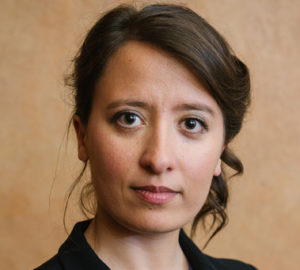 Elizaveta Gaufman is Assistant Professor of Russian Discourse and Politics at the University of Groningen, Netherlands.
Elizaveta Gaufman is Assistant Professor of Russian Discourse and Politics at the University of Groningen, Netherlands.
When I first discussed this post with Talk About editor Dmytro Vovk we lived in a different world. We chatted, exchanged screenshots, and I wondered whether my findings would even be interesting to the public. After all, pro-Kremlin social media users were not keen on invoking shared religion in conflict resolution and seemed to have drawn a line between Russians and Ukrainians. At the time of writing, the editor of this post is sheltering from air raids in Kharkiv with his family, and I am sending him daily messages hoping they are ok. What Putin’s regime is doing to Ukrainians is a crime. If those making decisions in the Kremlin actually did care about the common culture and religion that they claim to share with Ukrainians, they could at least remember “thou shalt not kill.”
In my chapter for the book Religion During the Russian-Ukraine Conflict, written in 2019 and based on a study of the most popular Russian social media outlet, Vkontakte, I noted that the role of Orthodoxy in the solution of the Ukraine crisis is doubtful both for the Russian elite and for the digital protagonists. Subscribers to the Vkontakte social media group Antimaidan were too busy denigrating Ukrainians as pigs, foreign stooges, gay men, and loose women, starting in 2013. Orthodoxy was used to describe only the “Russian World” that Ukrainians seemingly do not belong to, as they want to join that of godless gay Europeans. Online voices were eager for their President to protect fellow members of the flock and violate other countries’ sovereignty because, for members of the Russian World, borders are irrelevant as long as there are “brothers” to protect.
I am afraid I was right. These people do not care about God. They use religion to masquerade their imperialism. Sergei Lavrov, Russian foreign minister, said at the Kremlin security council meeting on 21 February 2022 that in Donbas “Slavs, Orthodox Christians, and everything Russian” is being persecuted by the West, a statement gleefully picked up by a number of pro-Kremlin Orthodox Telegram channels [1]. Pravblog, an Orthodox Telegram channel, was much more concerned with a “new geopolitical reality” and threatening a full-scale war instead of reflecting on the fact that “For he himself is our peace, who has made us both one and has broken down in his flesh the dividing wall of hostility.”
Back in 2012, Pussy Riot performed a punk prayer in two Russian cathedrals, where they lamented the fact that the Russian Patriarch believes in Putin instead of believing in God. They were right. So far, the only religious voice heard that condemned the conflict and offered mediation in peace negotiations is that of Russia’s Chief Rabbi Berl Lazar. The complete failure of the head of the Russian Orthodox Church, Patriarch Kirill, to condemn the war and his referring to some kind of “internal Ukrainian strife” is particularly glaring, as his main concern was the “dark forces that are tearing up the unity of Russia and the Russian Church.” This will probably be the end of Russian Orthodoxy as an organized religion in Russia because this is the kind of moral stain that will never be forgotten. Moreover, the Kremlin’s absurd claims of Ukrainian “denazification” were another cynical attempt to capitalize on the Crimean consensus, where the majority of the Russian population believed that the Ukrainian government was a “military junta” determined to wipe out Russian speakers. This narrative has already failed in 2022, and a growing number of people in Russia are realizing that if you “love thy neighbor” you do not bomb them.
It is difficult to assess how much of the social media chatter is genuine at this point because it is obvious that the Kremlin is ramping up its propaganda effort, including trolls. Even some Antimaidan users are becoming more skeptical after hearing reports from their family members in bomb shelters. But these reports of hardship and heartbreak are being drowned out by rape jokes, revenge glee, and even more dehumanization toward Ukrainians. Even those dropping the pretense and openly discussing Ukrainian partition—on a religious channel “Tsar’grad” no less!—do not mention religion once in their vile writing. The only way God figures in their statements is as they witness to the fact that they “were not the ones who started it.”
[1] Telegram channels are a form of one-way messaging where “admins” are able to post messages but other users are not. Any user is able to create and subscribe to channels. Channels can be created for broadcasting messages to an unlimited number of subscribers and have a permanent URL.
